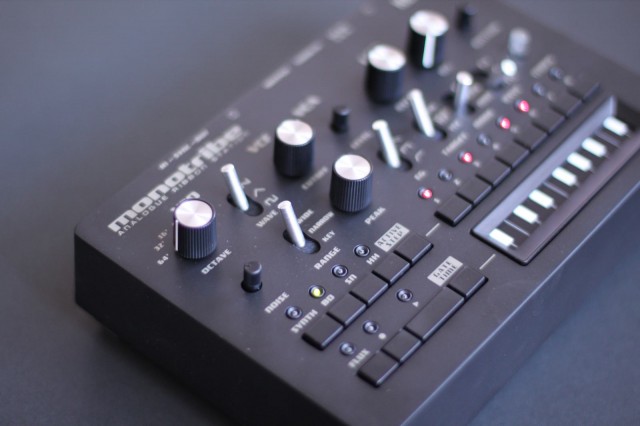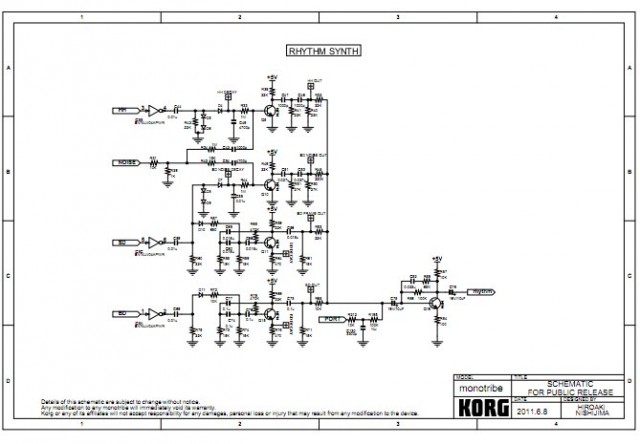
As they did with the monotron synthesizer, Korg has quietly released schematics for its the analog drum synthesis portion of its monotribe synth and step-sequencing rhythm machine. You just see the bits that make the drum sounds, but that’s the interesting and modifiable part.
In order to grab the download, you’ll need to fill out a form with your name and address, saying you acknowledge you’re voiding the warranty and that you won’t turn around and sue Korg. That address doesn’t get used for anything, though, so long as you uncheck the “newsletter” box. Once you do, you get a high-res PDF (low-res image above) with the schematics, marked public. (Liability I know is an important issue. You never know; you might swallow the drum circuits and then sue Korg for feeling ill afterwards. Or something. Ask a lawyer.)

As for the design itself, it’s a notably simple design by Hiroaki Nishijima, an elegantly-minimal set of analog circuits for producing sound. As such, it should be ripe for modification. In fact, the first thing I’d be inclined to do is, rather than void a monotribe’s warranty, simply breadboard this circuit, which would make for exceedingly easy variations on the same basic layout. You might even wind up with something else. (One nice touch in the design: look at how the noise source is cleverly – and necessarily – linked to hat and snare sounds.)
Mods have also worked with MIDI – a port is hidden on the board – but apparently with sometimes-disappointing timing results. More promising is the thought of new drum sounds, and even some breadboarded drum circuits outside the monotribe itself.
And that’s what I think is admirable about Korg’s approach: in the earlier days of sound and music electronics, publishing these kinds of schematics was the norm. As opposed to today’s litigious age, it was more or less assumed that straightforward ideas would be copied and modified. Korg hasn’t said they’re encouraging that kind of behavior, but by releasing the schematics, they at least acknowledge that they’re unafraid of that potential scenario. The point is, you wouldn’t come up with a cloned monotribe – you’d simply learn something about analog drum synthesis, then move on to something that’d be quite different. Korg remains the company with the wherewithal to produce the thing en masse, anyway. It’s not open source hardware, mind, so there’s a gray area as far as your ability to use the circuit, but that shouldn’t stop you from wiring this up and learning from it.
Ultimately, my guess is we’ll hear some new drum sounds out of this, and that’s exciting.
Find the schematics at:
http://www.korg.com/monotribeschematics
More on modifying monotribe:
An extensive, extensive post on MIDI modifications – how to do it, physically and electronically, as well as some of the limitations (which in turn partly explain why this didn’t ship with MIDI):
Monotribe, MIDI and me [Game Boy musician nitro2k01’s blog]
Video from above:
And one post on drum mods (I expect there are others, if you wish to share in comments):
MONOTRIBE drum mod and peek inside
In the interest of fairness, Chris Randall posted what I thought was a thought-provoking review of the monotribe. Keeping in mind Chris was apparently a great fan of the simpler, cheaper, smaller monotron synth – and produced an album with it / see link at bottom – his review of the monotribe and its bare-bones analog drums was pretty brutal.
See his original thoughts:
Monotribe Mini-Review…
…followed by some criticism of the monotribe in, oddly enough, an iOS-themed story:
iGear…
Chris isn’t one to mince words or be especially diplomatic, but it’s worth reading what he has to say. He also predicts I’ll like … something just like this story. But it’s worth considering all sides of this little box. And despite what Chris says about my own perspective, I still believe for real modification, open source hardware is best – not that all hardware need be open source, but rather that for hardware you want people to modify, the open source license is a useful tool. I also think that it’s okay to just use gear and not always modify it; playing instruments is great, too, speaking even personally. That said, I still think Korg releasing schematics is a big deal, and I’m enjoying getting inside this particular design. And for the record, Chris still put some monotribe sounds into his music.
See also:
Electronic Sounds and Satisfying Limits: Chris Randall Talks About Making Capacitor, Resistor EPs